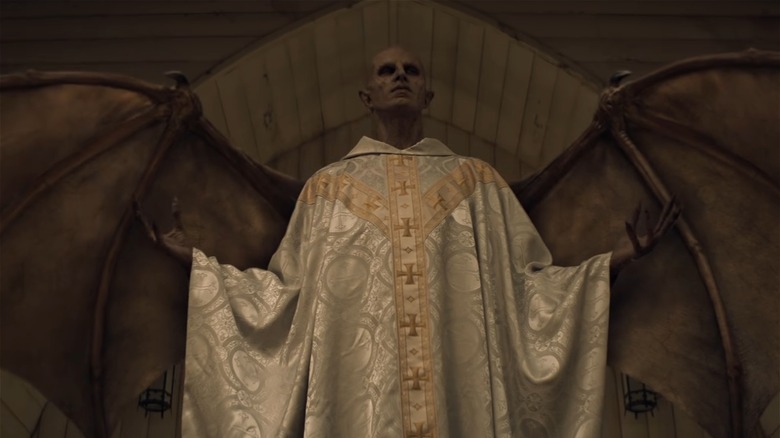
Horror director Mike Flanagan has some interesting ideas about the genre. "Horror affords us the opportunity to really look at ourselves and the things that scare us... as a society and individuals," he once told The New York Times. His characters often face literal ghosts. But just as often, they confront their haunting past mistakes -- lingering memories of grief or trauma. Ahead of the release of "The Haunting of Bly Manor," Flanagan said: "I really wanted to play more with ghosts as an expression of emotional wounds... how the past and present can echo each other." These themes inform the vast majority of his work -- from his early films like "Absentia" to his later television shows. Some projects are more successful than others. However, all of them are worth a watch -- if only to see a filmmaker fine-tune his ability over time to wield the tools of horror like few other directors today.
Flanagan's "The Midnight Club" drops on October 7. Like his previous television series, it's an adaptation of a horror novel. Christopher Pike's "The Midnight Club" follows a group of kids who promise to contact one another from beyond the grave. Based on the trailer, the show promises to be just as thrilling and incisive as Flanagan's other work. Meanwhile, let's look back at his extensive career to see just how his films and TV shows shake out. Here are the 10 best Mike Flanagan horror movies and shows, ranked from worst to best.
Before I Wake
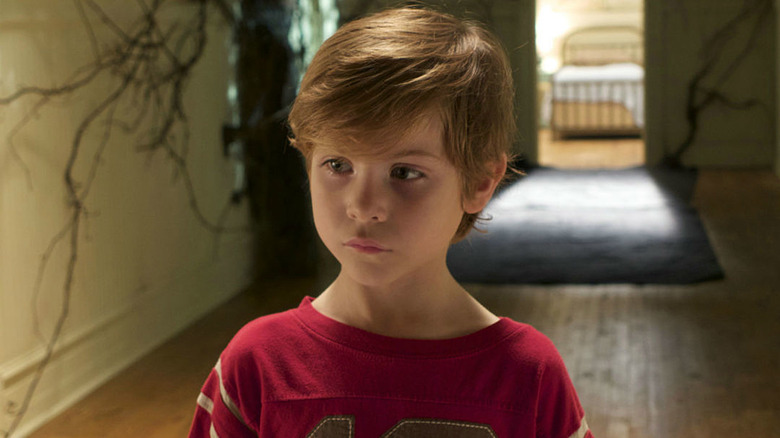
It's not usually a great sign when a movie sits on the shelf for years, and that's what happened with Mike Flanagan's melancholy "Before I Wake." The movie was shot all the way back in 2013, and then the release got shuffled repeatedly as Relativity Media collapsed. Instead of hitting theaters, Netflix premiered the film in early 2018. After all the build-up, the movie is...fine?
"Before I Wake" follows a couple (Kate Bosworth and Thomas Jane) mourning the loss of their son. They decide to foster a young boy named Cody (Jacob Tremblay), but they soon realize Cody has a gift: whatever he dreams becomes real. For a while, this means beautiful butterflies and visions of their son. However, he manages to manifest his nightmares too. More than anything else, Flanagan is great at creating lovable characters. He gets performances out of his actors to match. Tremblay is fantastic, as his wide-eyed gaze is simultaneously full of wonder, pain, and loss.
Soon Cody becomes plagued by a figure he calls The Canker Man -- a pale, gaunt monster that he claims ate his mother. The creature design is a bit too silly to be scary — which makes sense, as it's a child's nightmare. But as a result, several of the film's horror sequences fall flat. Unfortunately, the movie loses steam around the one-hour mark, and the final act feels more denouement than climax.
Absentia (2011)
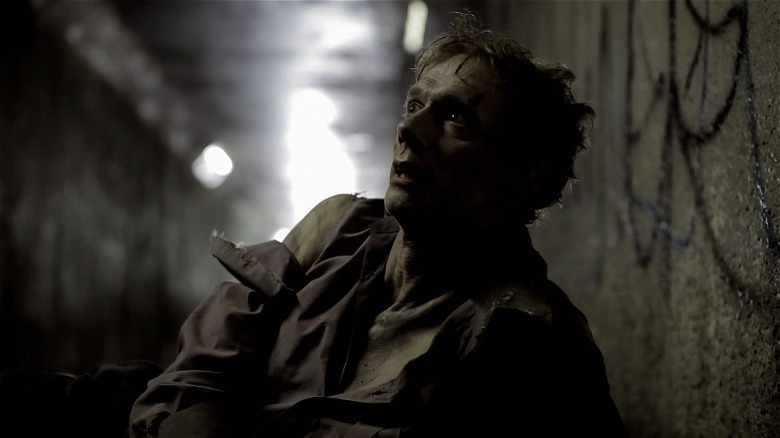
"Absentia" is about Tricia (Courtney Bell), whose husband has gone missing. After seven years, she decides to declare him dead in absentia. Her sister Callie (Katie Parker) visits to help sort through the bureaucracy of that and its emotional toll. But a supernatural mystery unfurls when Callie goes for a run through a nearby tunnel and finds an emaciated man (Doug Jones) who is surprised she can see him.
This is Mike Flanagan's first feature-length horror film. Like "Before I Wake," it's a movie brimming with ideas that don't always coalesce. Callie is a recovering substance abuser who finds solace in religion, while Tricia is pregnant and has struck up a relationship with the detective (Dave Levine) assigned to her husband's case. Many of the concepts in "Absentia" appear in the director's later work. Tricia experiences hollow-eyed supernatural visions that aren't ghosts exactly but manifestations of grief and guilt. "Absentia" is about trying to move on after tragedy -- a theme Flanagan will return to repeatedly.
Flanagan funded the film with a Kickstarter campaign. Unfortunately, "Absentia" is held back by its low budget. The lack of money for special effects means that many scares are of the "cut to black" variety, missing the unflinching eeriness of his later work. The detective subplot feels cliché. While Parker and Bell are excellent, other performances are not. "Absentia" shows a lot of promise, but little else.
If you or anyone you know is struggling with addiction issues, help is available. Visit the Substance Abuse and Mental Health Services Administration website or contact SAMHSA's National Helpline at 1-800-662-HELP (4357).
Dr. Sleep
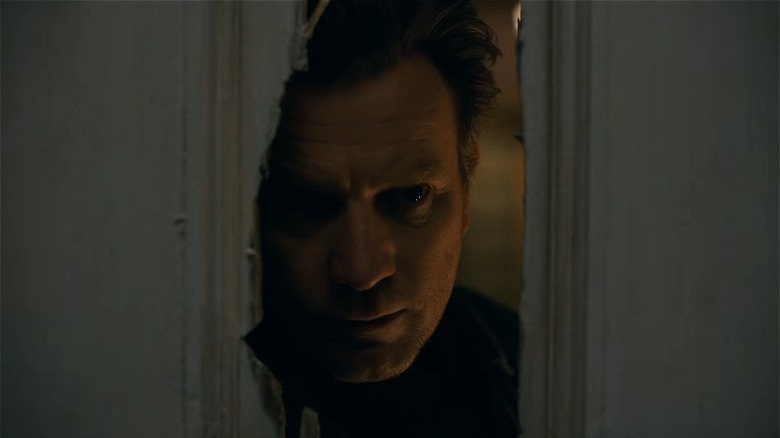
Some of the best directors are masters at taking other people's stories and spinning them into cinematic gold -- like Alfred Hitchcock's "The Birds" and Stanley Kubrick's "The Shining." Mike Flanagan is too.
While many of Flanagan's first films revolved around original ideas, the director's career hit its stride when he started adapting other people's stories. He has an incredible eye for breaking a story down into its essential elements and then rebuilding it into something wholly original. "Doctor Sleep" is a great example of this: It balances being a solid adaptation of Stephen King's (not-great) novel and a sequel to Kubrick's 1980 film.
In "Doctor Sleep," Danny Torrance (Ewan McGregor) is all grown up. The kid from "The Shining" now works in a hospice, easing the residents' deaths. After his abilities attract the attention of the True Knot — a psychic cult that feeds on the suffering of others — Danny rescues a young girl named Abra (Kyleigh Curran), who has the shining too. Inexorably, they become drawn back to the Overlook Hotel.
King famously hated Kubrick's "The Shining," but Flanagan can't avoid its iconography. "Doctor Sleep" is at its best when it examines the psychic scar that "The Shining" left on cinematic horror. (That carpet! The axe wound in the closet door!) The rest of the story is a bit convoluted, but Flanagan does the best he can with what he has. Again, Tremblay stars in a particularly horrific and standout scene.
Oculus
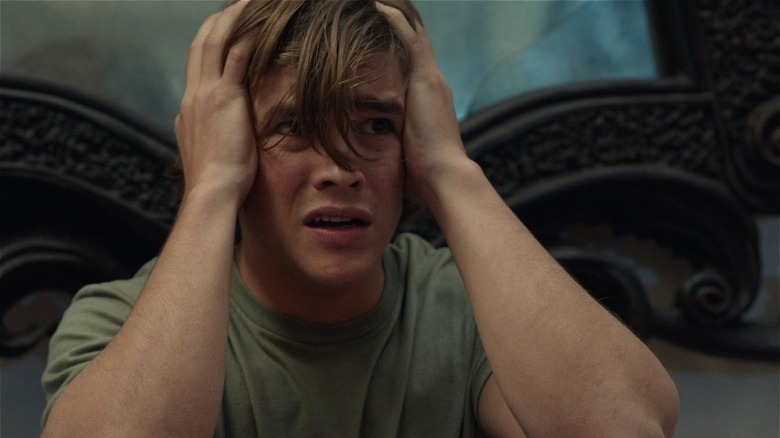
In the context of his career, 2013's "Oculus" feels like Mike Flanagan still figuring out his formula. His characters walk in and out of memory, haunted by apparitions and by the psychological echoes of the trauma they experienced in the past. The film's supernatural occurrences center around an ominous mirror that has a storied history of claiming victims. Siblings Kaylie (Karen Gillan) and Tim (Brenton Thwaites) blamed the mirror for the destruction of their family when they were younger. After being released from a mental hospital, Tim discovers that his sister has reacquired the horrible home furnishing that tortured them so long ago. He wants to let his memories go and move on, but she wants proof of what happened to them.
"Oculus" moves between timelines. Actions in one timeline affect and speak to the horrors in the other. While many of the scares are effective, and the movie has back-to-back compelling moments, its twisted timelines and convoluted storytelling ultimately hamper the emotional effectiveness rather than heighten it.
If you or someone you know needs help with mental health, please contact the Crisis Text Line by texting HOME to 741741, call the National Alliance on Mental Illness helpline at 1-800-950-NAMI (6264), or visit the National Institute of Mental Health website.
Ouija: Origin Of Evil
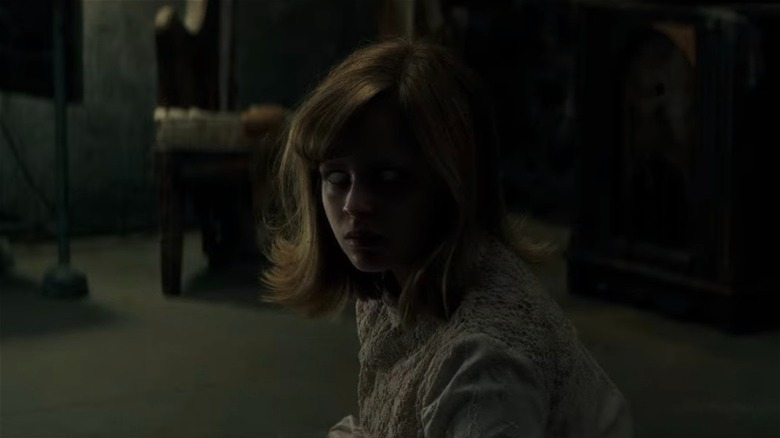
A prequel about the origins of an evil board game sounds silly, but Mike Flanagan's "Ouija: Origin of Evil" is anything but that. The film wants to shock and scare you as much as possible to make up for its premise, and it succeeds. The original "Ouija" was a post-"Conjuring" studio dreck, but Flanagan takes the bones of that story and refashions it into a delightfully-eerie possessed-kid movie. Lulu Wilson is fantastic as the creepy Doris, a little girl who learns to channel spirits with the help of her charlatan-fortune-teller mother's Ouija board. "Ouija: Origin of Evil" takes place in 1967. Although they digitally shot the movie, Flanagan added film grain to shots in post-production (per FreshFiction.tv). Effects like cigarette burns to indicate reel-changes, split diopters, and more makes "Ouija: Origin of Evil" feel like a movie from the '60s.
Here is the inflection point where Flanagan's troupe of actors starts to coalesce. Annalise Basso was in "Oculus," Kate Siegel starred in "Oculus" and "Hush," and Doug Jones is back from "Absentia." Also, this is Flanagan's first collaboration with Elisabeth Reaser and Henry Thomas, who would later appear in "The Haunting of Hill House," among other works. Flanagan's stories are about how trauma echoes through time, so re-using the same actors in new configurations adds intriguing layers to the film.
Hush
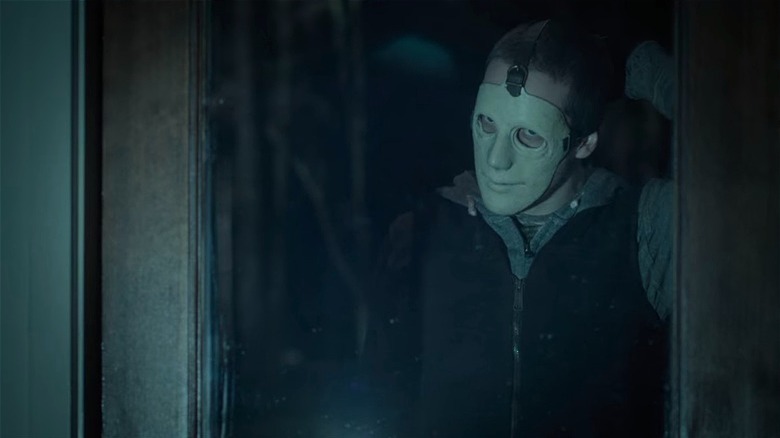
"Hush" is Mike Flanagan's most straightforward thriller. There are no ghosts, and definitely no physical manifestations of grief or trauma. There is only Maddie (Katie Siegel), a novelist who is deaf and living in the woods. Unbeknownst to her, there's a masked man outside (John Gallagher Jr.) her home, stalking her. Later, she writes on the window in lipstick: "WON'T TELL. DIDN'T SEE FACE. BOYFRIEND COMING HOME." But there is no boyfriend, and he knows it. In response, he removes his mask. She's sure seen his face now.
"Hush" is a fantastic cat-and-mouse game of a movie, with participants in its devilish dance trying to outsmart one another. The man has an advantage — he can hear her every move — but Maddie knows her home, and she knows what tools she has at her disposal to outwit the intruder. Flanagan wrings incredible, live-wire tension from this mismatch -- occasionally taking us inside Maddie's point-of-view: all of the sounds drop away and make us feel what a frightening situation this would be for someone unable to hear. But ultimately, her disability becomes an advantage.
Both lead performances are excellent, although it's with noting that Flanagan could have cast a deaf actress rather than his hearing wife. (Flanagan and Siegel now say she wouldn't play the role were they to make the movie today, per Indiewire). Flanagan's filmography has made many moving, complex examinations of loss and love. But this one's downright scary.
The Haunting Of Bly Manor
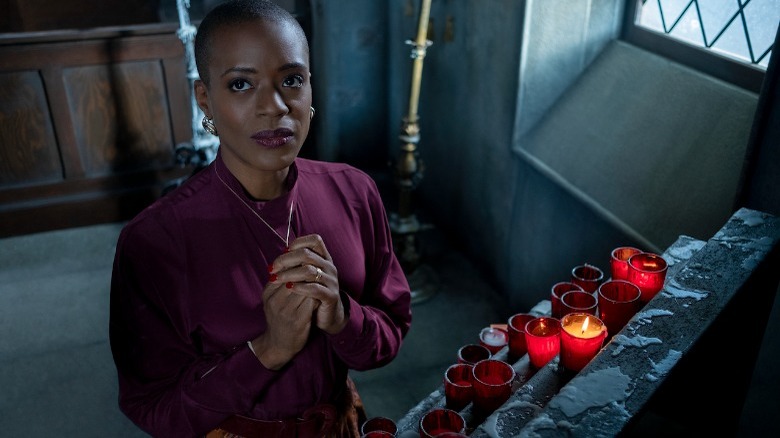
"The Haunting of Bly Manor," the second installment in Mike Flanagan's "Haunting" anthology, caught a lot of viewers by surprise. Unlike "The Haunting of Hill House," which often aimed for straightforward supernatural horror, "Bly Manor" was something different. In a behind-the-scenes video for Netflix, Flanagan defined the series as "a love story... a gothic romance." Flanagan's "Bly Manor" is an adaptation of "The Turn of the Screw" and several other Henry James ghost stories. The director infuses classic horror literature with detailed characters and a modern eye to form a touching story about queer love.
In "The Haunting of Bly Manor," Victoria Pedretti plays a nanny who is hired to tutor two creepy kids. The house is populated by other service people like the housekeeper Hannah (T'Nia Miller), the cook Owen (Rahul Kohli), and the gardener Jamie (Amelia Eve). Of course, there's a ghost named the Lady in the Lake (Kate Siegel). Those two categories of characters significantly overlap by the end of the series.
Rather than being "scary," "Bly Manor" double down on being haunting -- it's sad and deeply unsettling. Overall, it's a rewarding experience as this show contains some of the most sympathetic characters Flanagan has created. Miller is particularly excellent as Mrs. Grose. But it's Pedretti and Eve who carry the show as its central couple. A deeply-empathetic masterwork, "Bly Manor" is well worth a watch.
Gerald's Game
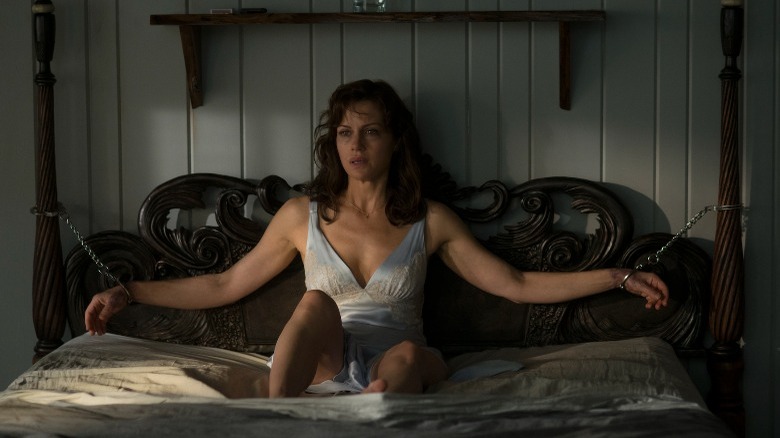
In Netflix's "Gerald's Game," Gerald (Bruce Greenwood) and Jessie Burlingame (Carla Gugino) head to a remote lake house to spice up their sex life. Gerald handcuffs Jessie to the bed, and the two play out a rape fantasy roleplay. But when Jessie wants to stop things, Gerald has a heart attack and dies -- leaving Jessie handcuffed with her dead husband on the floor. No one will be looking for them for a long time. Left alone with her thoughts, Jessie remembers a long-repressed incident of sexual abuse at the hands of her father (Henry Thomas), which occurred at the eerie height of a total solar eclipse.
Stephen King's "Gerald's Game" novel is known as one of King's most unadaptable books, considering most of the story plays out through conversations with the voices in the solitary main character's head. However, Mike Flanagan's film adaptation gets the job done. Jessie's voices are manifested as visions of her dead husband and herself, letting Jessie examine her problem and its possible solutions through dialogue. This choice puts the film's themes squarely in Flanagan's wheelhouse: He loves a ghastly vision representing trauma.
Gugino and Greenwood's committed performances understand the idiosyncratic rhythms of King's dialogue more than the most King adaptations. The film's climactic gore effect is one of the most grotesque in horror cinema. Overall, the film is an absolute masterclass in streamlined yet emotional horror.
If you or anyone you know has been a victim of sexual assault, help is available. Visit the Rape, Abuse & Incest National Network website or contact RAINN's National Helpline at 1-800-656-HOPE (4673).
The Haunting Of Hill House
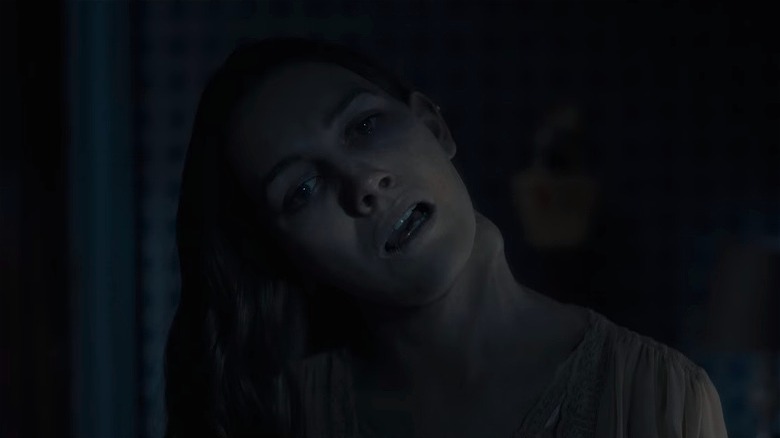
"The Haunting of Hill House" was Mike Flanagan's first foray into crafting a limited series for television. It marked an exciting new path for the filmmaker. For my money, he's an even better television creator than a feature film director. "Hill House" stands as a powerful testament as to why. Flanagan boils Shirley Jackson's seminal novel down to its essential elements -- a haunted house, a family name, a line of dialogue — and then refashions everything into a wholly-original, multi-generational epic about a family scarred by the trauma of living in a house populated by ghosts.
The show's highlight is its sixth episode, "Two Storms." The episode shifts back and forth between present and past, showing the Crane family dealing with (fittingly) two storms. Most of "Two Storms" is made to look like one long take, seamlessly traveling through time as events in the past inform the present and vice versa. Whereas earlier Flanagan projects struggled to balance his unique brand of visions moving through twisted timelines, "Hill House" is plotted perfectly, reaching emotional crescendos that somehow continue to top themselves.
Also, it's really, really scary. Flanagan fills his frames with ghostly apparitions, faces, and figures hidden in shadows. The show's main ghosts — the Bent-Neck Lady, the Tall Man, and more — are instant-classic horror monsters. While most of the show is more elegant and elegiac, there's one particular jump scare that's one of the most frightening ones ever filmed.
Midnight Mass
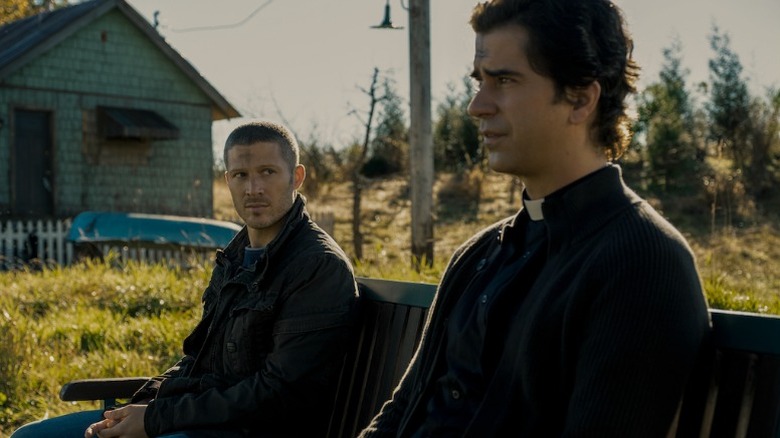
"Midnight Mass" is Mike Flanagan's most complex and emotionally-stirring work. It's also his most existentially frightening. He gets some of the best performances out of his actors, delivering some of his most poetic writing... and it's his first original idea after half a decade spent in adaptation! "Behind Stephen King is a great place to hide," he told The New York Times. "This is much more frightening."
The limited Netflix series focuses on the isolated community of Crockett Island. As the story begins, two men arrive. After serving time for a drunk-driving accident that took a woman's life, Riley Flynn (Zach Gilford) returns to his hometown. Father Paul (Hamish Linklater) is a charismatic priest coming to take over the local parish. Both have brought demons with them to the island. Riley becomes haunted by visions of the woman he killed. But Father Paul's demons are literal. It's a stunningly intimate portrait of a community whipped into the mania of a religious revival. But it's also a deliciously-demented creature feature, spinning into original and twisted mythology.
When "Midnight Mass" hit Netflix, there was much conversation about whether Flanagan's elaborate monologues were helping or hurting his story. For me, Flanagan's monologues are a feature, not a bug -- like Stephen King's idiosyncratic dialogue. I'm someone who loves watching actors act, and "Midnight Mass" is an absolute treat. We witness stars like Rahul Kohli and Linklater deliver career-best performances that are poetic, haunting elegies about life and existence. I wouldn't trade that for anything.
Read this next: All 59 Stephen King Movies Ranked From Worst To Best
The post The 10 Best Mike Flanagan Horror Movies And Shows, Ranked appeared first on /Film.
